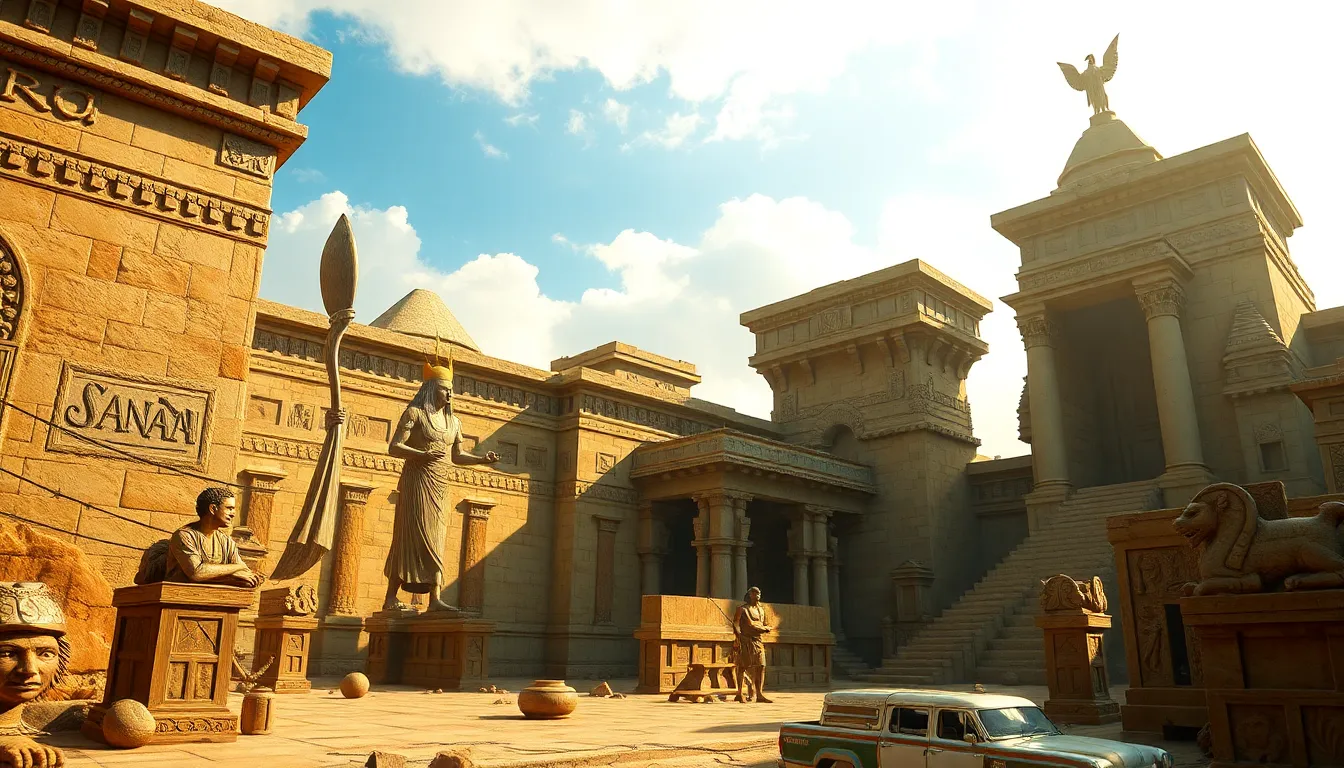The Role of Divine Kingship in Ancient Egyptian Economy
I. Introduction
Divine kingship in ancient Egypt refers to the belief that pharaohs were not only political rulers but also divine entities with a sacred connection to the gods. This notion played a central role in the governance, culture, and economic structures of ancient Egyptian society.
The economy of ancient Egypt was intricately linked to the concept of divine kingship, as the pharaoh was seen as the intermediary between the gods and the people, ensuring prosperity, stability, and order. The purpose of this article is to explore the interplay between divine kingship and the economy, highlighting how religious beliefs shaped economic practices and structures throughout ancient Egyptian history.
II. Historical Context of Divine Kingship
Divine kingship emerged in early dynastic Egypt around 3100 BCE, when the first pharaohs established their rule over unified Egypt. The idea that the king was a divine figure can be traced back to the unification of Upper and Lower Egypt, symbolized by the double crown.
Key pharaohs, such as Narmer (also known as Menes), played significant roles in solidifying the concept of divine kingship. Narmer’s victory over rival factions and his unification of the kingdom set the precedent for future rulers who would embody divine authority.
The evolution of divine kingship can be seen in various periods, from the Old Kingdom’s focus on monumental architecture and afterlife beliefs to the New Kingdom’s expansionist policies and increased foreign relations, demonstrating the adaptability of this concept to changing political landscapes.
III. Theological Foundations of Divine Kingship
The religious beliefs surrounding pharaohs posited that they were gods on earth, often associated with deities such as Horus and Osiris. This divine status granted them the authority to govern and maintain ma’at, the principle of cosmic order and justice.
Mythology and rituals played a critical role in legitimizing kingship. Ceremonies, such as the Heb Sed festival, celebrated the pharaoh’s continued vitality and reaffirmed his divine right to rule.
The connection between divine authority and economic control was evident in the pharaoh’s role as the ultimate owner of all land and resources. By controlling the economy, the pharaoh fulfilled his divine duty to provide for the people and maintain harmony within the realm.
IV. Economic Structures Under Divine Kingship
The ancient Egyptian economy was primarily agrarian, relying heavily on the Nile’s annual floods to irrigate crops. The state played a crucial role in managing resources, with the pharaoh overseeing large-scale agricultural projects and redistributing resources to ensure the welfare of the populace.
Key aspects of the economic structures included:
- Agriculture: The backbone of the economy, with major crops including wheat, barley, and flax.
- Trade: Exchange of goods, both local and foreign, facilitated by the pharaoh’s authority.
- Labor: Organized labor systems, often involving corvée labor, where citizens worked on state projects.
Land ownership was centralized under the pharaoh, though local officials managed the agricultural production and resource distribution, ensuring that the needs of the population were met.
V. Taxation and Tribute Systems
The pharaoh instituted mechanisms of taxation to fund state projects and maintain the economy. Taxes were often collected in the form of grain, livestock, and labor, reflecting the agrarian nature of the society.
Tribute from vassal states also played a significant role in the economy. Conquered regions were required to pay tribute, which enriched the central treasury and reinforced the pharaoh’s power. Economic implications of these systems included:
- Wealth Redistribution: Taxation facilitated the redistribution of resources, helping to support public works and the priesthood.
- Social Hierarchy: Taxation systems contributed to social stratification, with the elite benefiting disproportionately.
The impact of taxation was profound, influencing social structure and the distribution of wealth throughout the kingdom.
VI. Monumental Projects and Economic Investment
The construction of monumental projects, such as pyramids and temples, had significant economic impacts. These projects not only showcased the pharaoh’s divine status but also required immense resources and labor.
The organization of labor for these projects involved:
- Corvée Labor: Seasonal labor drafted from the population, particularly during the inundation when agricultural work was minimal.
- Skilled Labor: Artisans and craftsmen who specialized in construction, sculpture, and decoration.
Long-term economic benefits of these projects included increased agricultural productivity due to improved irrigation systems and the promotion of trade through increased tourism to these religious sites. The cultural significance of these monuments also reinforced the pharaoh’s divine authority.
VII. Divine Kingship and Trade
The pharaoh’s authority significantly influenced trade networks, both within Egypt and with neighboring regions. Control over trade routes allowed the pharaoh to regulate economic exchanges and acquire luxury goods from other civilizations, such as gold, incense, and exotic animals.
Foreign relations, often mediated by the pharaoh, established vital trade agreements. The exchange of goods had several implications:
- Cultural Exchange: Trade facilitated the flow of ideas, art, and technology between Egypt and other cultures.
- Economic Prosperity: Successful trade agreements contributed to the wealth of the kingdom, allowing for further investments in public works and military expeditions.
Ultimately, the pharaoh’s role in trade was essential for maintaining economic stability and reinforcing the divine kingship through the accumulation of wealth and resources.
VIII. Conclusion
The interconnections between divine kingship and the economy of ancient Egypt are profound and multifaceted. The pharaoh, as a divine ruler, not only governed the people but also shaped the economic landscape through taxation, resource management, and monumental projects.
The legacy of divine kingship is evident in the lasting cultural and architectural achievements of ancient Egypt, which continue to captivate modern society. Understanding the economic structures under divine kingship provides valuable insights into how ancient civilizations functioned and thrived, highlighting the essential role of leadership in shaping economic systems.
In reflection, the study of divine kingship in ancient Egypt offers critical implications for understanding the economies of ancient civilizations today, emphasizing the interplay between religion, governance, and economic practices.




